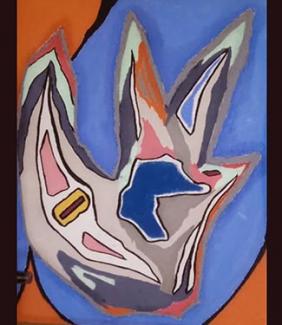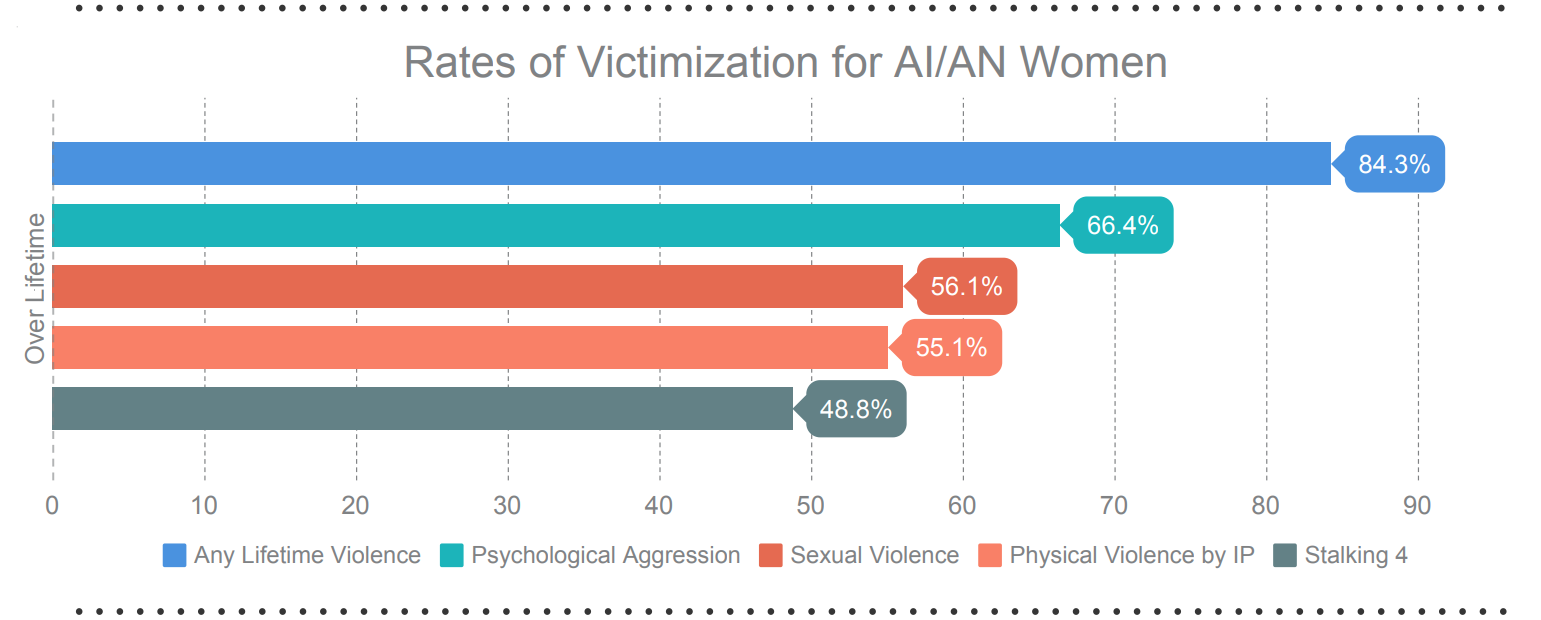By Oyesola Oluwafunmilayo Ayeni, Policy & Research Analyst Consultant with the National Resource Center on Domestic Violence
Gender-based violence affects the majority of American Indian and Alaska Native (AI/AN) peoples. About 84.3% of AI/AN women have experienced some form of violence during their lifetime. Domestic and sexual violence are leading causes of homelessness and housing instability. Adequate and stable housing is a main concern for AI/AN survivors. Besides historical injustices, AI/AN peoples experience economic problems that affect their housing stability. The poverty rate for AI/ANs is as high as 32%, and the rate of unemployment on some reservations is as high as 80%.
The National Resource Center on Domestic Violence (NRCDV), National AI/AN Women’s Resource Center (NIWRC) and the Alaska Native Women’s Resource Center (AKNWRC) convened a workgroup of gender-based violence and housing advocates from Indian country to reflect on the needs of AI/AN survivors. The next section outlines some of the needs identified in the workgroup. Please note that these needs are not exhaustive, and they do not represent the needs of all AI/AN survivors. Survivors have needs that are unique to where they are and the type(s) of violence they have experienced. Advocates should tailor their efforts to meet the unique needs of each survivor.
Needs of AI/AN survivors identified by the workgroup
- Autonomy and respect. AI/AN survivors need services that are survivor-centered and empowering. Autonomy and respect are foundational aspects of advocacy practice. This approach is generally centered within the gender-based violence field. Advocates should acknowledge survivors as the experts of their own experiences and lives. Services should align with what survivors indicate would be supportive.
- Housing advocacy and services. AI/AN survivors face increased economic barriers which creates a need for housing services. Advocacy efforts should focus on helping AI/AN survivors get safe and affordable housing. This includes emergency, transitional housing, and permanent and supportive housing. Housing services should be available for on and off-reservation Indians. Gender-based violence advocates should work with housing advocates to find adequate housing options for survivors in their communities. Housing services should not further displace AI/AN survivors from their communities.
- Culturally specific services. AI/AN survivors need culturally specific resources that honor traditional culture. When an AI/AN survivor connects with an AI/AN advocate, the outcomes are better. The shared experiences of AI/AN people reduce the need to explain the context around an experience of violence. Tribally run or AI/AN focused resources are better able to address the needs of survivors. They can offer various services including traditional healing services, language immersion, and ceremony.
- Healing spaces. AI/AN survivors need access to services that center cultural ways of healing. Traditional Native healing programs should be available to survivors. These services should be available on and off-reservations. This may include healing/talking circles, spiritual counseling, and healing ceremonies. AI/AN trauma experts and community healers should lead these spaces. These spaces should center AI/AN values, relationships, and cultural connectedness.
- Spaces that meet the needs of children. AI/AN survivors need spaces that honor and support their children. They need access to resources necessary for children to thrive and heal. AI/AN families have strong legacies. Tribal communities value the family structure. Advocacy efforts should include support for children and families. This can include childcare and other services that meet the needs of the child.
- Flexible funding assistance. AI/AN survivors need immediate and flexible funding assistance to meet their needs. Many AI/AN survivors experience economic problems. Advocates should use flexible funding resources to provide support to AI/AN survivors. Access to immediate financial assistance allows AI/AN survivors to address urgent needs. These may include housing needs such as rent and security deposits. Other needs may include childcare, transportation to work, or utilities. Providing flexible funding can increase the economic security of AI/AN survivors.
Conclusion
In conclusion, AI/AN peoples have experienced a long history of injustices and discrimination. As a result, many AI/AN survivors experience high rates of poverty and housing instability. Victim advocates should seek to understand the unique needs of AI/AN survivors. This is essential because the experiences, needs, and culture of Indian country varies. This knowledge will help victim advocates tailor response services.
For more information:
Resources:
- Report: National Workgroup on Safe Housing for American Indian and Alaska Native Survivors of Gender-Based Violence: Lessons Learned. The National Indigenous Women’s Resource Center, the Alaska Native Women’s Resource Center and the National Resource Center on Domestic Violence convened a meeting in Phoenix, Arizona on June 4-5, 2019 to establish a National Workgroup on Safe Housing for American Indian and Alaska Native (AI/AN) Survivors of Gender-Based Violence. The goal of this workgroup was to bring together experts from Indian country who work in the fields of gender-based violence and housing to develop policy and create concrete recommendations for technical assistance, resources and other supports for the sole purpose of increasing the availability of safe, affordable, accessible and sustainable housing for AI/AN survivors of gender-based violence. This report details themes that emerged from the convening, lessons learned, and recommendations for increasing access to safe and affordable housing for AI/AN survivors of gender-based violence.
- WEBINAR: The Nexus between Gender Based Violence and Housing Insecurity for American Indian and Alaska Native Survivors. For most survivors of sexual and domestic violence housing is an immediate and necessary need. For American Indian and Alaska Native Survivors the need is no different – but the additional barriers and complexities can sometimes feel insurmountable. In this webinar, presenters discuss American history’s impact in American Indian and Alaska Native housing instability and the findings from a group of experts from Indian country who work in the fields of gender-based violence and housing.
- Paper: Colonization, Homelessness, and the Prostitution and Sex Trafficking of Native Women. This paper illustrates the impact of human trafficking on Native women and girls in our times, with particular attention to the historical context in the United States and the interconnection between trafficking and housing instability.
Organizations:
- National AI/AN Women’s Resource Center, Inc. (NIWRC). NIWRC is a Native-led nonprofit organization dedicated to ending violence against Native women and children. The NIWRC provides national leadership in ending gender-based violence in tribal communities by lifting up the collective voices of grassroots advocates and offering culturally grounded resources, technical assistance and training, and policy development to strengthen tribal sovereignty.
- The Alaska Native Women's Resource Center (AKNWRC). AKNWRC is dedicated to strengthening local, tribal government's responses through community organizing efforts advocating for the safety of women and children in their communities and homes, especially against domestic and sexual abuse and violence.















